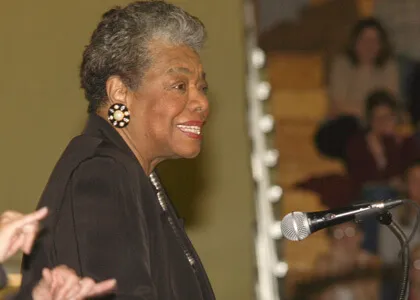“You are the rainbow,” she told a spellbound and near-capacity audience of students, faculty, staff and community members. Her lyrical, unflinching voice flitted silkily from songs and poems to personal anecdotes and sage advice for almost an hour. The tall, imposing woman sat down periodically during her remarks. “I have a bad knee,” she said, “and the other knee is feeling sympathetic toward it today.”
Born Marguerite Johnson in 1928, Angelou spoke briefly of her childhood in rural Stamps, Arkansas — a story of segregation and survival that is already etched in the hearts of millions of people who read I Know Why the Caged Bird Sings, her memoir of growing up black and poor in the 1930s and 1940s. A no-nonsense, religious grandmother and her crippled Uncle Willie raised Angelou and, she said, taught her to love learning. “I can still recite my multiplication tables perfectly,” she noted. After her uncle’s death, Angelou learned from his legacy that a life seemingly lived small can touch others in very meaningful ways.
Ancestry and family history were among her presentation’s recurring themes. Whether your ancestors were Scandinavian or Slovak, she told the audience, or brought to America on slave ships against their will, “Someone stayed alive so you could live.” Consequently, she said, each life comes with a responsibility to live up to its potential — not necessarily through grand gestures that change the world but through developing the traits of kindness, peacefulness, helpfulness and courtesy.
“Whatever happened to courtesy?” she mused, imitating the stilted jargon that passes for polite exchange today. Simply smiling and sincerely wishing someone “Good morning,” Angelou said, “is a gift you can give others.”
Language and life
Angelou, who is Reynolds Professor of American Studies at Wake Forest University, advised the many students in the audience to use their university experience “to lay down the heavy burden of ignorance,” especially using the tool of language.
Angelou said she tries to get a rudimentary grip on the native language whenever she travels. She shared her experiences as a young actress in a production of “Porgy and Bess” that traveled to Yugoslavia. During a visit to a local household, the ancient matriarch and patriarch screamed when they laid eyes on their first African-American, but Angelou was able to maneuver them through their initial fear by speaking their own tongue, and before long the trio was sipping slivovitz.
Angelou’s mastery of language and storytelling comes from a deep love of both. “I have never heard a voice I didn’t like,” she said in her deeply comforting cadence. Angelou also values the written word. She encouraged the audience to “Go to the library on Monday, or tomorrow, and check out some books of poetry,” and recommended some of her greatest influences: Paul Lawrence Dunbar, James Weldon Johnson, Langston Hughes, Shakespeare, Poe and the Bible.
“Poets,” she said, “study their craft just as open-heart surgeons do.”
Angelou also advised students to study at least one language other than English — not only to communicate, but also to foster respect and tolerance for people whose ideas and culture may differ vastly from their own. With knowledge comes understanding, she believes.
“I am a human being,” she said, repeating the phrase from the ancient Roman playwright Terence like a mantra. “Nothing human can be alien to me.”
